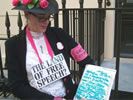Eye For Film >> Movies >> Taking Liberties (2007) Film Review
There's never been a better decade at the box office for documentaries. Perhaps it was the wake up call of 9/11 that stripped film of its sugar coating. At any rate, it was responsible for the most successful documentary ever, tubby firebrand Michael Moore's Fahrenheit 911. Such is documentary's influence now, they have the power to make politicians electable once more (Al Gore) or bring entire industries to their knees (Super Size Me).
It's a shame then that documentary Taking Liberties failed to meet with such success, as its message is just as important for all of us as Gore's An Inconvenient Truth, though I suspect it won't be made mandatory viewing for school kids as the latter has.

Director Chris Atkins sets out to show how the Labour government that came to power in 1997 has eroded the liberties enshrined in British history and constitution, often under the pretense of counter-terrorism, and the worrying consequences this poses.
Atkins makes a powerful argument. No UK government has ever passed quite as many laws as New Labour, and in this shower of legislation some shocking changes have passed almost unnoticed. Freedom to protest; not near the seat of government now, thank you very much. Imprisonment without charge, too, if Labour had had their way (it was the first of only two bill votes Blair lost). Habeas corpus? Well it's in Latin, so it can't be useful or important or anything, so that's out too. And so the abuses go on. If we're living in a nanny state, it's a nanny that shoots you before you put your hand in the biscuit tin, on the grounds that somebody doesn't like the biscuit tin very much and wants to destroy it, so actually, maybe none of us should have biscuits any more.
There are some wonderful clips. One in particular springs to mind: when two elderly women are hassled by a policeman, simply for being in view of a US army base (?!). "But I've got my back to it," one points out, stumping and infuriating the officer. It's a moment which neatly captures the absurdity of Labour's actions, and the very British common sense their opponents retain in the face of them.
As well as his own recording, and conversations with numerous talking heads, Atkins splices into the editing footage taken on the ground by protestors, giving his argument authenticity and convincing proof you sometimes feel those hippies campaigning in the local shopping centre lack. An astonishing scene captures Thames police locking protestors on board their coach and escorting them away from a peaceful protest they hadn't yet arrived at.
It had me won over by the end, but it's an important documentary rather than a perfect one. The flash animations of a pillar with our supposed rights on, and a cartoon showing how Hitler came to power, lose the film credibility, and don't work nearly as well as the bullet narrating American history in Moore's Bowling For Columbine.
The scattergun approach (Atkins tackles everything from freedom of protest to US extradition treaties) invariably misses its targets on occasion too. Though Guantanamo Bay is a shocking symbol of Western hypocrisy (And as Atkins points out, X-Ray is only one of many such camps America runs nationwide), using Mozzam Begg as an example is always questionable, for his background is far murkier than he claims. And the scorn Atkins pours on a counter-terrorism expo seems misplaced - one scanner that can detect if someone has a gun on them seems perfectly reasonable, rather than an outrageous invasion of privacy.
But most glaringly, as damning as the evidence is, he gives Labour no right of reply. The only defence given are speeches made by Blair and Jack Straw in the Commons - a place hardly known for clear and concise oratory. Perhaps cabinet ministers had no wish to comment: fine, but it should have been made clear. Without this, the film is reduced to unbalanced polemic, and Cannes juries won't fall for that twice. Ironically, by giving no right of reply, an integral part of the freedom of the press, Atkins has undermined the liberties that we should all (be entitled to) hold dear.
Reviewed on: 14 Oct 2007




















